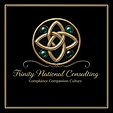
Trinity National Consulting

Trinity National Consulting Research Division
The Trinity National Consulting Research Division is the applied research and standards development arm of Trinity National Consulting, Inc., a U.S.-based organization dedicated to advancing ethical leadership, regulatory excellence, and cultural transformation in high-risk and compliance-driven industries.
Operating at the intersection of leadership science, regulatory systems, and organizational ethics, the Division conducts empirical and translational research that bridges theory and practice across disciplines, including quality management, artificial intelligence governance, and human-centered organizational design.
Its mission is to research and validate leadership, ethics, and other scholarly publications through scholarly inquiry, standards alignment, and peer-reviewed dissemination.
The Research Division collaborates with academic institutions, regulatory bodies, and industry partners to:
-
Develop and publish Bodies of Knowledge (BoK) and professional certification standards.
-
Validate leadership and governance frameworks through quantitative and qualitative research methods.
-
Support the integration of ethical intelligence into governing body-aligned systems.
-
Advance the field of Ethical AI and Responsible Innovation through the Trinity Pillars™ for Secure AI Integration initiative.
All research is conducted under the Division’s guiding ethos— “Where Intelligence Meets Integrity™”—reflecting Trinity’s commitment to transforming compliance from a checklist into a culture of ethical excellence.

Volume 1
High-risk regulated industries, including pharmaceuticals, biotechnology, and defense, face an enduring implementation gap in ethics: compliance programs often fail to translate into ethical behavior without supportive culture and leadership. The Trinity Pillars™ Framework integrates Compliance as Ethical Architecture, Compassion as Strategic Leadership Competency, and Culture as Ethical Infrastructure to address this gap. Grounded in General Systems Theory, deontological ethics, Psychological Safety Theory, and virtue-based culture models, and aligned with FDA QMS regulations, ISO 31000/37301 standards, NIST Risk Management Framework, and EU AI legislation, the framework provides a unified governance model. The PillarMetric™ Ethical Leadership Risk Assessment, drawing on validated measures (Ethical Leadership Scale, Corporate Ethical Virtues model, Psychological Safety Scale), operationalizes the framework. While this paper is conceptual, an empirical validation agenda outlines confirmatory factor analysis, reliability, and criterion validity studies. Sectoral applications demonstrate measurable improvements in compliance performance, error reporting, and stakeholder trust. Future research with longitudinal, cross-cultural, and technology-enabled implementations will complete the validation process and embed ethical leadership principles into global regulatory standards.
Volume 2
Conceptual Validation of the PillarMetric™ Ethical Leadership Scorecard: A Framework for Assessing Ethical Risk in Leadership
Ethical leadership remains a critical determinant of organizational resilience, regulatory compliance, and cultural sustainability in high-risk industries. Yet despite significant advances in leadership ethics and compliance science, there is no standardized risk-assessment framework for evaluating ethical maturity within leadership systems.
.png)
.png)
Volume 3
Artificial intelligence (AI) systems now make decisions that influence economies, health, social welfare and democracy. Governments and organizations have responded by developing governance frameworks aimed at reducing technical risks, covering areas such as bias detection, data provenance and algorithmic transparency. Yet there is growing recognition that AI governance must go beyond technical controls. Ethical failures often stem from human leadership structures that embed values, accountability and decision‑making cultures into AI projects, rather than from algorithms alone.

Volume 4
Artificial intelligence (AI) has become an integral component of decision-making in safety-critical domains such as transportation, healthcare, and industrial operations. As algorithmic systems assume responsibilities once reserved for human judgment, they increasingly face moral dilemmas analogous to the classical trolley problem.